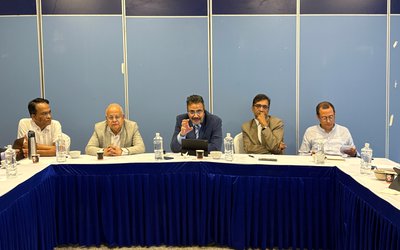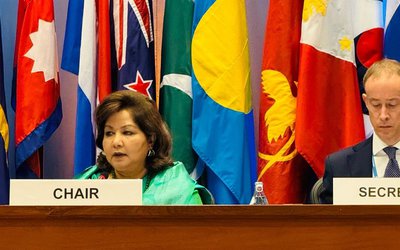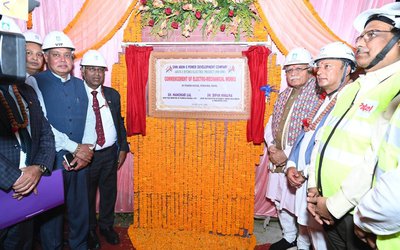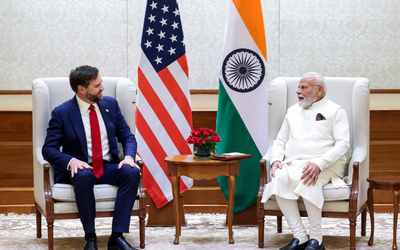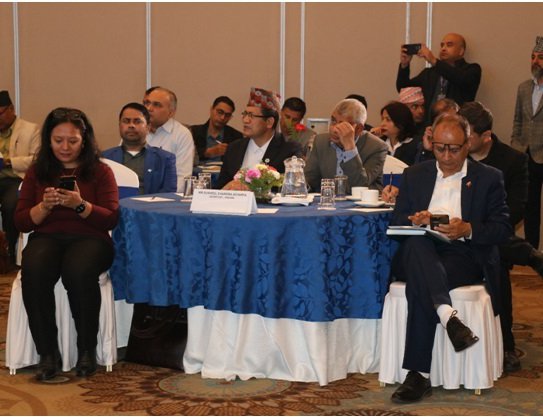
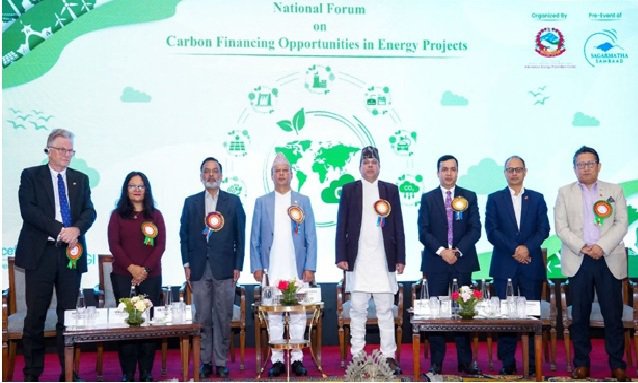
In light of Nepal's role as the host of Sagarmath Sambad to raise awareness about global climate issues, the Alternative Energy Promotion Center (AEPC) organized a "National Symposium on Carbon Finance Investment Opportunities in Energy Projects."
As a Least Developed Country (LDC) highly susceptible to climate change-induced disasters, Nepal has suffered significant damage from extreme rainfall patterns. To address this, Nepal requires funding for investment, with carbon finance investment presenting a viable option.
Under the leadership of Executive Director Nawaraj Dhakal, who brings extensive experience in the field, AEPC convened a high-level symposium to explore opportunities.
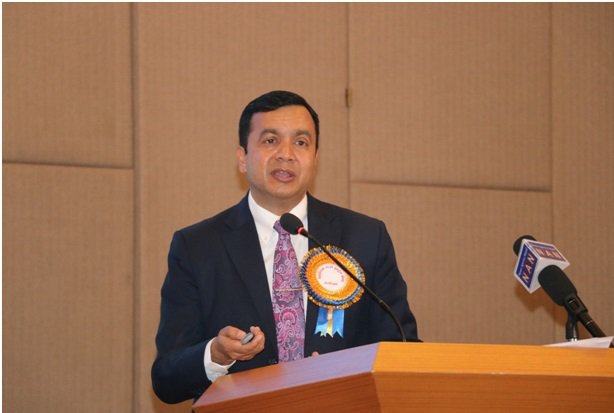
The Government of Nepal was supported in successfully hosting the "Sagarmatha Dialogue" by The Sambad, which will advocate for climate justice from May 16 to 18, 2025. The symposium aimed to contribute to the campaign by foc using on the topic of "Climate and Carbon Finance Investment" in its discussion agenda.
The event, inaugurated by Minister of Energy, Water Resources and Irrigation Deepak Khadka and chaired by Secretary of the Ministry of Energy, Water Resources and Irrigation Suresh Acharya, addressed various aspects of climate and carbon finance mobilization.
It brought together stakeholders from government, development partners, private sector, civil society, and others to discuss the role of carbon finance investment in Nepal's renewable energy and energy efficiency sectors.
The symposium strengthened partnerships on carbon finance mobilization, shared knowledge and experiences in this sector, and identified opportunities for climate finance investment to help Nepal achieve its climate and clean energy transformation goals.
It aimed to enhance understanding of carbon finance investment methods and mechanisms in the energy sector, provide information on the Center's achievements in carbon trading, and promote compliance and voluntary carbon markets.
Strengthen partnerships between public and private sectors, development partners, and local communities to explore new opportunities for carbon investment and promote carbon finance in the country.
The primary goals of the workshop were to offer recommendations to enhance the policy framework for enhancing the investment policy environment.
The workshop aimed to raise awareness and understanding of carbon finance investment mechanisms and the advantages they bring, as well as to advocate for the use of carbon for sustainable development.
Robust collaborations between government entities, the private sector, and development partners to create a roadmap for financial investment potential, stakeholder commitment to developing and implementing carbon projects in Nepal in the future, and enhancements to Nepal's climate policy.
Valuable suggestions have been provided to facilitate the expansion of the carbon market. During the program's inauguration ceremony, Minister Khadka, who also served as the chief guest, stated that the proceeds from carbon sales would be utilized to benefit the poor and economically disadvantaged.
He stressed the importance of mobilizing resources for the benefit of marginalized citizens. By installing meters, including solar panels, for the poor, disadvantaged, and marginalized individuals living in remote areas through the Carbon Fund, an income-generating environment can be created for locals, benefiting disadvantaged citizens supported by the government.
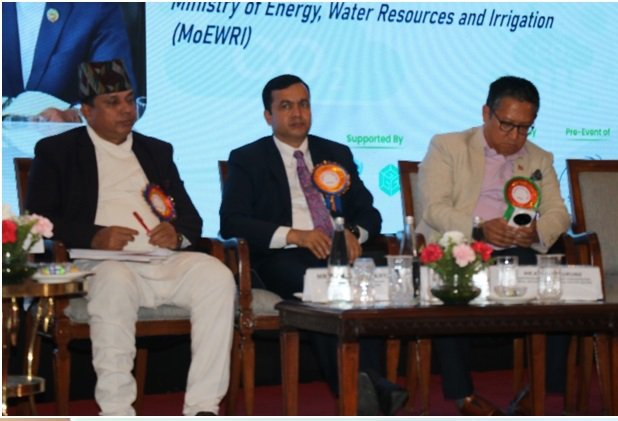
He stated that achieving the goal of making Nepal prosperous will be aided by the initiative. Minister Khadka emphasized the importance of collaborative efforts in reducing carbon emissions, noting Nepal's commitment to the Paris Agreement and its target of achieving net zero carbon emissions by 2045. He expressed confidence in the role of renewable energy and energy efficiency in the clean energy transformation necessary to reach this goal.
The government's focus on expanding renewable energy and enhancing energy efficiency to reduce greenhouse gas emissions is evident in its policies, strategies, plans, and targets. Nepal recently approved the 'Energy Development Roadmap and Action Plan, 2081', highlighting the prioritization of renewable energy, energy efficiency, and clean energy transformation in both international commitments and national objectives related to clean energy and climate change.
The roadmap aligns with long-term objectives such as achieving net zero carbon emissions by 2045, the Second Nationally Determined Contribution, the 16th Plan, and other national and international goals.highlighted that the objectives outlined in the roadmap are aligned with the ultimate goal of achieving net zero carbon emissions by 2045, the Second Nationally Determined Contribution, the 16th Plan, and other domestic and international targets.
He stressed that the enactment of these goalshas been given top priority. Member of the National Planning Commission, Prof. Dr. R.P. Bichha, suggested that Nepal should strive to maximize the benefits from carbon trading.
He underscored the importance of establishing a community-owned carbon trading framework in Nepal to maximize benefits. Bichha suggested that involving the private sector in carbon trading could further enhance the benefits for Nepal.
He commended the efforts of the Alternative Energy Promotion Center in implementing the Paris Agreement.
Suresh Acharya, Secretary of the Ministry of Energy, Water Resources, and Irrigation and Program Chair, highlighted that the seminar identified the requirements, opportunities, and challenges of investing in carbon finance for energy projects, prioritized feasible carbon finance projects, generated investment prospects, and facilitated resource mobilization for the transition to clean energy.
Nawaraj Dhakal, Executive Director of the Alternative Energy Promotion Center, delivered a presentation on "Climate Finance Investment Opportunities in the Energy Sector and the Center's Contribution."
The presentation covered topics such as the carbon trading market mechanism, the carbon project cycle, the Paris Agreement on climate change and its provisions, carbon projects developed by the Center to date, opportunities and challenges for carbon finance operators, and the future roadmap.
He mentioned that the Center has been involved in carbon trading related to renewable energy technology since 2005 and has achieved certified emission reductions equivalent to approximately 6.4 million units, earning 4.83 billion rupees from carbon sales.
He expressed optimism that the symposium would support the 'Sagarmatha Dialogue' scheduled for May 16 to 18, advocating for climate justice.
He highlighted that the Paris Agreement on Climate Change introduces a "Market Based Approach" to reduce greenhouse gas emissions, building on the principles of the Kyoto Protocol.
Under the Paris Agreement, Article 6 (specifically Articles 6.2 and 6.4) outlines mitigation mechanisms with a market-based approach, while Article 6.8 focuses on mitigation mechanisms with a non-market approach.
He also mentioned that Nepal has significant potential for compliance carbon trading and voluntary carbon trading as outlined in Article 6. Dr. Mukesh Ghimire, Deputy Director of the Center, discussed the symposium's objectives and delivered a welcoming speech. The event, attended by over 100 stakeholders in climate finance and carbon trading, was led by Parbata Bhatta, Deputy Director of the Center.
During the second part of the program, a technical session focused on "Opportunities and Challenges of Carbon Finance Investment in Nepal's Energy Projects."
Speakers in the technical session, chaired by Sushil Chandra Acharya, Joint Secretary at the Ministry of Energy, Water Resources, and Irrigation, emphasized the importance of leveraging carbon finance to support the transition to clean energy through renewable energy and energy efficiency.
Participants included Prakash Lamichhane, Research Officer at the Ministry of Forests and Environment, Pooja Sharma, Country Director of Practical Action Nepal, Inez Manandhar, Climate Finance Analyst at the United Nations Development Programme, Dipesh Joshi, Programme Chief at the Global Green Growth Initiative (GGGI), and Keshav Das, Head of UNICEF's South Asia Regional Office.
Pooja Sharma, country director of Practical Action, has shown how immense oppurtunities are there in the global leel to lure the investment. She cautioned that the market of carbon fluctulates very fast.
The discussion was led by Kushal Gurung, President of the Nepal Renewable Energy Confederation, and Dr. Prem Kumar Pokharel, a climate finance expert, delivered a presentation on "Opportunities and Challenges of Carbon Finance Investment in Nepal's Energy Projects."
Hosted by the center, which boasts more than two decades of experience in the carbon market, this symposium aims to explore the opportunities and challenges of carbon finance investment, share knowledge and experiences in this area, and foster investment opportunities in carbon finance.
This program is crucial for bolstering Nepal's presence in the global carbon market, contributing to the country's transition to clean energy, and advancing climate-related objectives by effectively addressing the opportunities and challenges of climate finance.
- Budget Session Of Federal Parliament Commencing On Friday
- Apr 24, 2025
- 19th Democracy Day Being Observed Today
- Apr 24, 2025
- Hot Wave Likely To Occur In Terai Belt Of Lumbini Province
- Apr 24, 2025
- UAE's Deputy Prime Minister In Kathmandu; Bilateral Meeting Today
- Apr 23, 2025
- PM Oli Condemns Terrorist Attack In India
- Apr 23, 2025



